Working collies, known for their toughness, unyielding demeanor, and innate herding instinct, underwent a significant transformation in the borderlands between England and Scotland over a century ago. Adam Telfer, a dedicated Northumbrian shepherd, aimed to blend these hostile collies’ tenacity and natural herding talents with a gentler and more approachable breed to create a more manageable sheepdog. Telfer’s efforts resulted in the birth of Old Hemp, a canine associated with the beginning of the modern border collie.
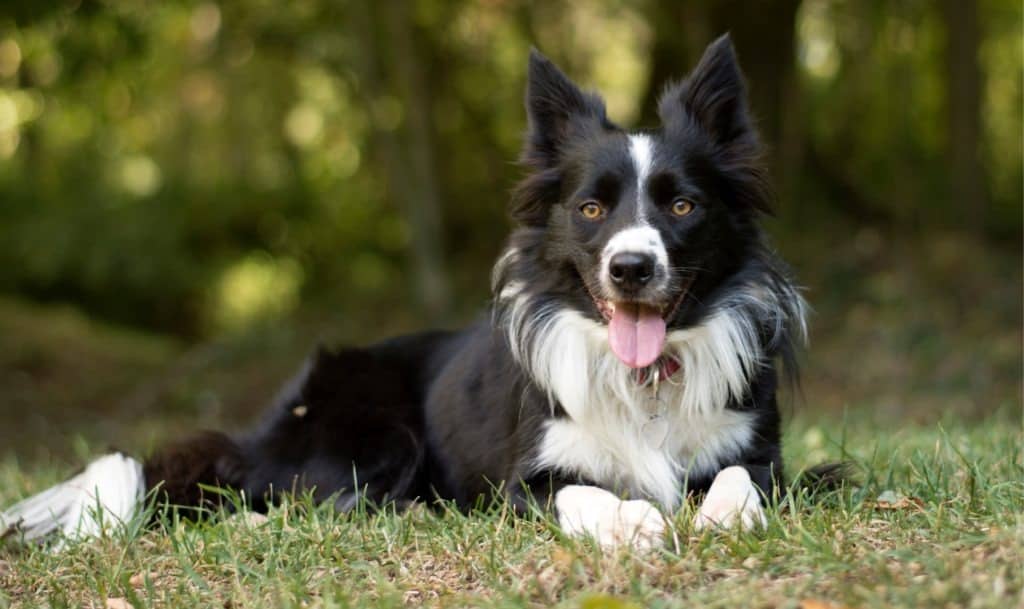
This border collie bears a striking resemblance to Old Hemp, who sired over 200 offspring.
©Tepepa79/Shutterstock.com
Old Hemp’s offspring, commonly known as border collies or farm collies, evolved to possess an exceptional combination of endurance, intelligence, and an innate work ethic, a direct result of the demanding tasks they undertook from their shepherd owners. Over time, these canines found their way into the homes of families across the globe. Despite the shift in their living environments, border collies brought with them a rich evolutionary history, carrying the legacy of their boundless energy, inherent need for purpose, and remarkable intelligence. These traits, once essential for their herding duties, continue to define the breed and remain integral aspects of its character. In modern times, the responsibility to fulfill these collies’ exercise needs falls to their owners, a role that historically fell to herding as the essential outlet for their boundless energy.
The Importance of Exercise
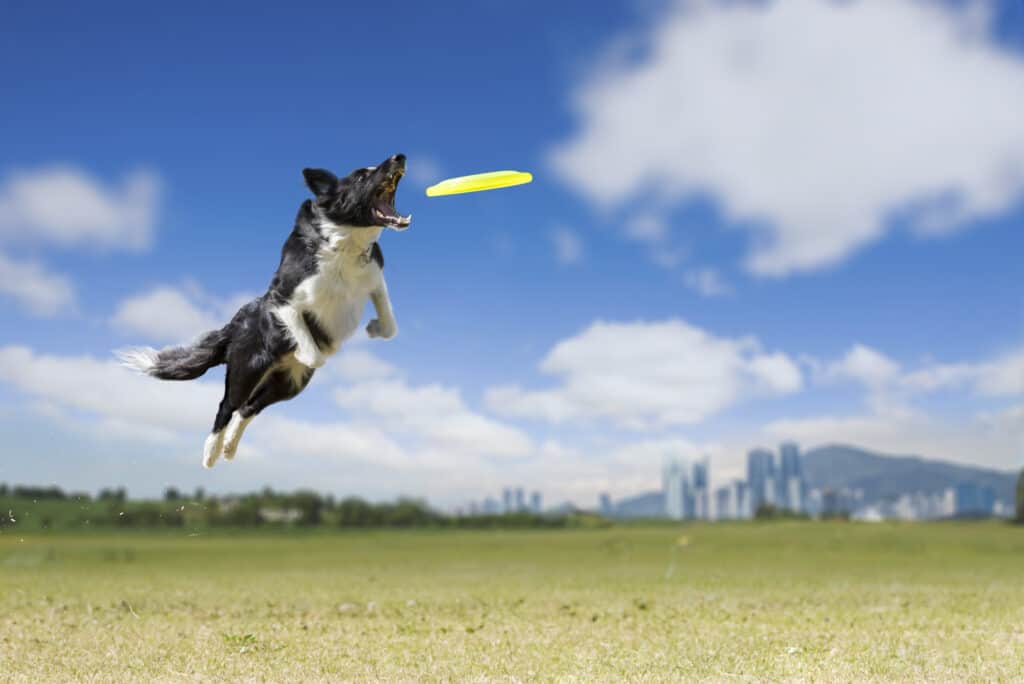
Border collies thrive in high-energy activities, such as disc dog.
©iStock.com/wooyaa
Exercise is crucial to maintain a border collie’s physical and mental well-being. These canines are wired for high intensity and heightened reactivity to movement due to their breeding, designed to endure demanding, long work hours in all weather conditions. Collies actively seek purpose and require more than just a stroll or a brief backyard playtime because their intelligence necessitates constructive channeling through focused attention and training. This breed truly comes to life when given a role and the space to release its endless energy. A border collie represents the breed that never tires, and even those not engaged in herding work require a daily regimen of robust exercise.
For anyone thinking about adding a border collie to their life, it is critical to prepare for an active partnership. Border collies are not a match for individuals who prefer a relaxed lifestyle or frequently travel. Potential owners must understand that this canine is not a low-maintenance breed, and providing the required attention, training, and exercise can turn them into outstanding pets. However, if you cannot meet this breed’s care and activity level, it would be wise to explore different canine types or consider a less demanding companion from your local animal shelter.
Daily Activity Requirements
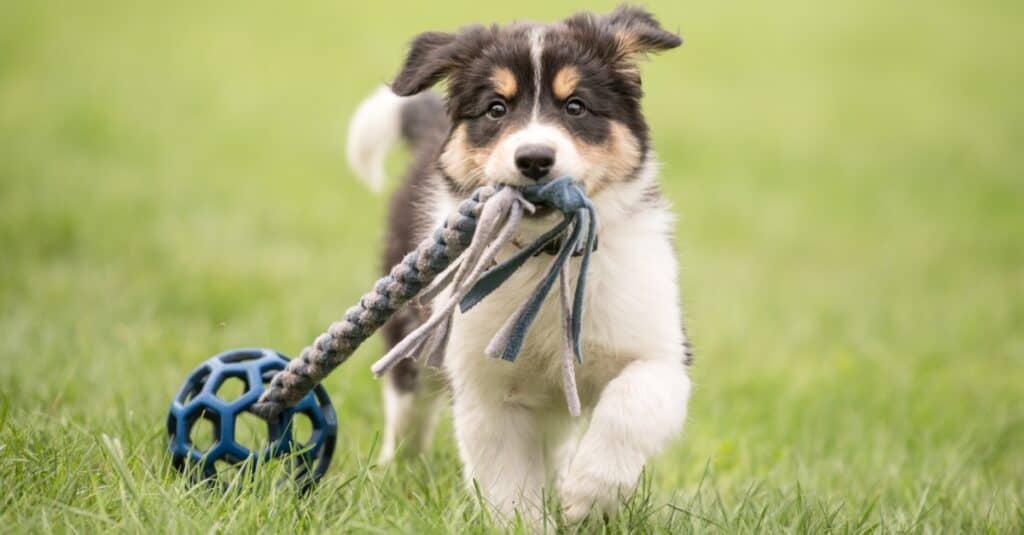
Border collies crave a balance of physical activity and mental stimulation.
©iStock.com/K_Thalhofer
You will want to prioritize at least two solid hours of exercise every day to meet a border collie’s physical and mental well-being standards. The adage “the more, the better” certainly holds for this breed.
A typical exercise routine for your collie might involve several walks throughout the day. These walks are a fantastic opportunity for your collie to explore their surroundings, satisfy their inquisitive nature, and engage their remarkable intelligence. However, exercise quality is equally vital.
Off-lead exercise in a secure area is a must for border collies. It allows them the freedom to run, play, and unleash their boundless energy in a controlled environment. This activity helps maintain their physical health while ensuring they remain emotionally content and satisfied.
Border collies are not just pets. They are active companions that require your dedication to their well-being. By meeting their exercise needs, you are promoting their health and nurturing a powerful and harmonious bond between you and your collie for years to come.
Exercise Ideas

Border collies should avoid recurring routines, as this could bore them and impact them mentally.
©Lobstrosity/Shutterstock.com
Staying active is the blueprint to a happy and healthy life for border collies, and there is a world of exercise options to keep their agile minds and bodies engaged. Your border collie must not have a recurring routine, as this could bore them and impact them mentally. Their daily routines should be as unique as possible, as an unpredictable routine is equally vital for a dog’s mental well-being.
Some other fun activities you could include in your border collie routine are below.
Cycling
For a high-energy dog like the border collie, cycling can be great for maintaining their physical and mental health by building their stamina. However, always watch them during the ride to ensure they are not overexerting themselves.
Hiking
Hiking is an excellent opportunity to explore the great outdoors together and bond. However, always ensure the route suits your dog and matches their fitness level.
Playtime
This is a fundamental aspect of a collie’s daily routine. Games like fetch, tug of war, hide and seek, and scent games keep them happy and active. Always remember to use pet-safe toys.
Running
Running is another great way to bond with your collie. Incorporating short bursts of gentle jogging within your regular walk is a fantastic introduction to gradually increasing intensity.
Swimming
For water fans, swimming is an excellent choice. It is easy on their joints and offers a cooling experience, whether this activity takes place in a pool, the sea, a river, or a lake. However, always practice water safety to keep your furry friend safe.
Whatever activities you choose for your border collie, the key is to prioritize a dynamic routine that keeps them physically and mentally stimulated. Doing this will lead to a happier, healthier border collie and a more satisfying friendship.
The Importance of Mental Stimulation Activities

Puzzle feeders are engaging for collies, requiring them to put their problem-solving skills to work.
©Dvorakova Veronika/Shutterstock.com
Mental stimulation is crucial to keep your border collie’s thinking skills sharp. Just like humans, dogs can grow slow and bored when faced with the same routine each day. Our canine companions, too, thrive on intellectual engagement and excitement in their lives. Your furry friends can remain engaged, happy, and fulfilled when introduced to various mental exercises and games.
Dogs crave mental stimulation, as it gives them a sense of purpose. Their eagerness to please and innate desire for mental challenges make them more content and less likely to engage in undesirable behaviors, especially for border collies. Playing with your dog, having training sessions, and creating challenging games can go a long way in satisfying their hunger for intellectual challenges.
Effective Strategies for Mental Stimulation Needs
Puzzle Toys
Specifically designed to provide entertainment and stimulate their problem-solving abilities, puzzle toys are great at keeping your border collie’s mind active. As your dog works to solve the puzzles, their focus and mental agility are activated.
Learning New Tricks
Teaching your collie new tricks is a fun way to bond while improving their impulse control. Tricks such as shaking a paw, rolling over, and sit and stay are excellent places to start. Slowly add new tricks to their repertoire to keep their minds engaged and to strengthen the bond between you and your dog.
Obstacle Courses
You can set up obstacle courses at home to challenge your dog mentally and physically. Use household items creatively to create an enticing setup that your collie can navigate around and through. This activity is a great way to promote physical activity and mental stimulation.
Hide and Seek
Dogs love playing hide and seek. Team up with another person and have your dog sit in a room while you find a hiding place. Encourage your dog to locate you with the help of your human friend. When your furry friend discovers you, reward them with lots of praise, pats, and ear rubs.
Toy Names
You can help your collie learn the names of their toys by starting with one or two toys they play with frequently. You can then make a game out of it by having your canine locate the toy commonly played with during playtime to reinforce their memory. Gradually introduce more toys until your dog has mastered remembering all the toys’ names.
Toy Cleanup
When playtime is over, you can teach your dog to put their toys away. This simple task provides mental stimulation while instilling a sense of responsibility in your furry friend.
Nose Games
Dogs rely heavily on their sense of smell, making scent games a fantastic mental exercise. You can hide treats around the room for your collie to search for and eventually make the games more challenging when they locate the food faster.
Feeding Games
Using puzzle feeders or food-dispensing toys can turn feeding times into fun mental exercises. These require your collie to work for their food, providing a satisfying mental challenge with their meal.
Mental stimulation is critical for your border collie’s well-being. It keeps them engaged, happy, and on their toes, both mentally and physically. Incorporating these activities into their routine can lead to a healthier, more content, and fulfilled collie.
Border Collies in Dog Sport Activities
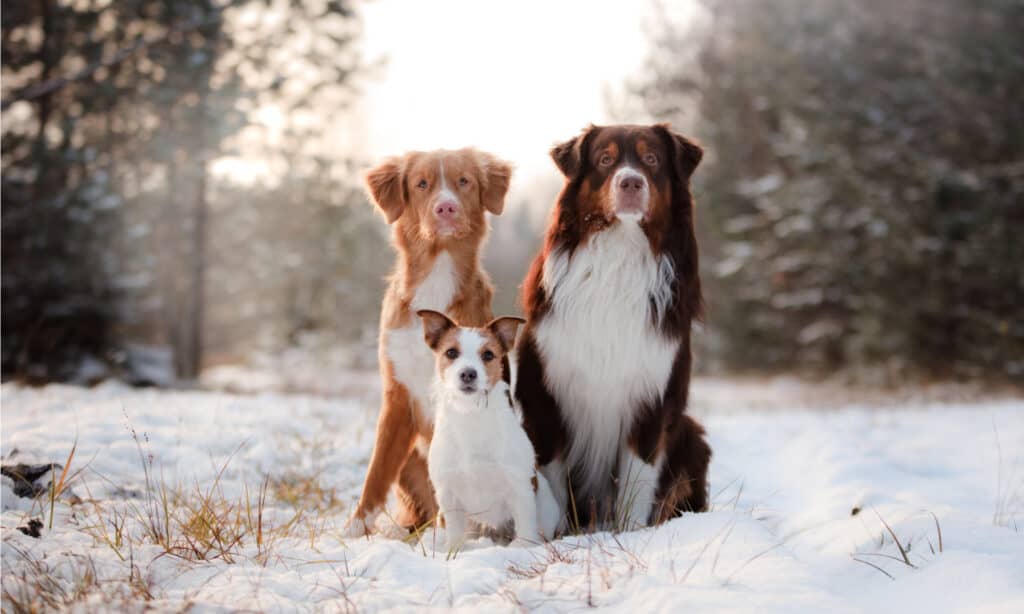
People have bred border collies with
Jack
Russell
terriers to participate in flyball competitions.
©dezy/Shutterstock.com
Border collies are popular in the dog sports world for their exceptional intelligence and physical prowess. For example, this breed excels in agility, a sport that demands dogs to navigate obstacles like weave poles, teeter totters, jumps, and tunnels. They undergo strict training to master these obstacles and compete in agility courses. Border collies often dominate this sport thanks to their lightning speed, unwavering obedience, navigation skills, and superb ability to leap over the highest jumps, all of which make it challenging for other breeds to compete. These canines are so remarkable that in England, separate agility trials are held to recognize their exceptional performance.
Another sport where border collies excel is flyball, a team sport where four dogs race against another team to achieve the fastest time in a relay-style race. Dogs sprint down a course with jumps to reach a spring-loaded box, triggering a tennis ball’s release. Border collies’ incredible speed, agility, and enthusiasm make them top contenders in this high-energy and thrilling sport.
Frisbee is another activity where border collies shine. In the expert level of competition, handlers and their dogs have limited time to perform a routine set to music. This sequence involves an array of frisbee tricks, from long-distance jumps to catching multiple discs and performing various tricks. Points are then awarded based on different aspects, like jump distances and the number of discs caught. Although this sport is still gaining traction, border collies have already established themselves as prominent players, having participated on many professional teams at special events throughout the calendar year.
Primary Exercise Safety Considerations
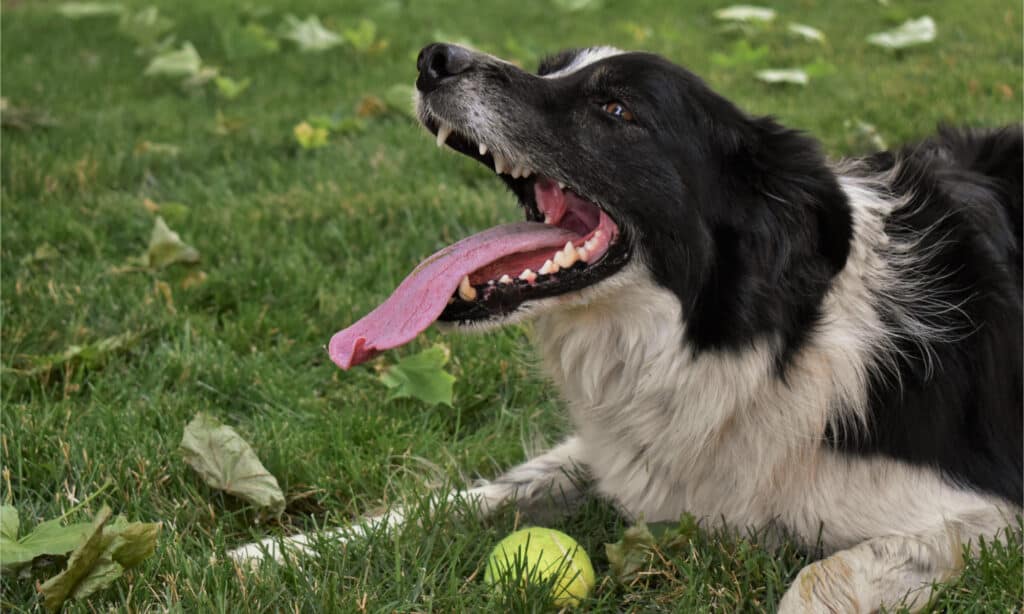
If your dog seems overly tired or stressed, provide breaks and plenty of fresh water to rehydrate them.
©Diane Isabel/Shutterstock.com
Ensuring your border collie’s safety during outdoor activities is crucial for their health. Border collies exhibit minimal fatigue signs, even when pushed to their limits, and their inherited drive lacks an “emergency stop button” due to their breeding. This form of evolution may result in your dog appearing tireless even after lengthy sessions of ball games, highlighting the owner’s crucial role in recognizing their limits.
A border collie’s relentless pursuit is rooted in their herding instincts, making herding activities irreplaceable for them. Nothing can match herding, as tennis balls do not evoke the same reactions as herding sheep. Repetitive games of fetch, for example, can even trigger your dog’s chasing instinct, leading to the release of stress hormones. While these hormones fade rapidly, excessive ball throwing can turn your dog into a “ball junkie” constantly anticipating the next throw. Your overstimulated dog may then react to other stimuli with hunting behavior, which could be potentially dangerous.
Prioritizing your border collie’s safety during exercise involves making informed decisions. Provide appropriate activities and keep an eye on their cues.
Other Safety Concerns
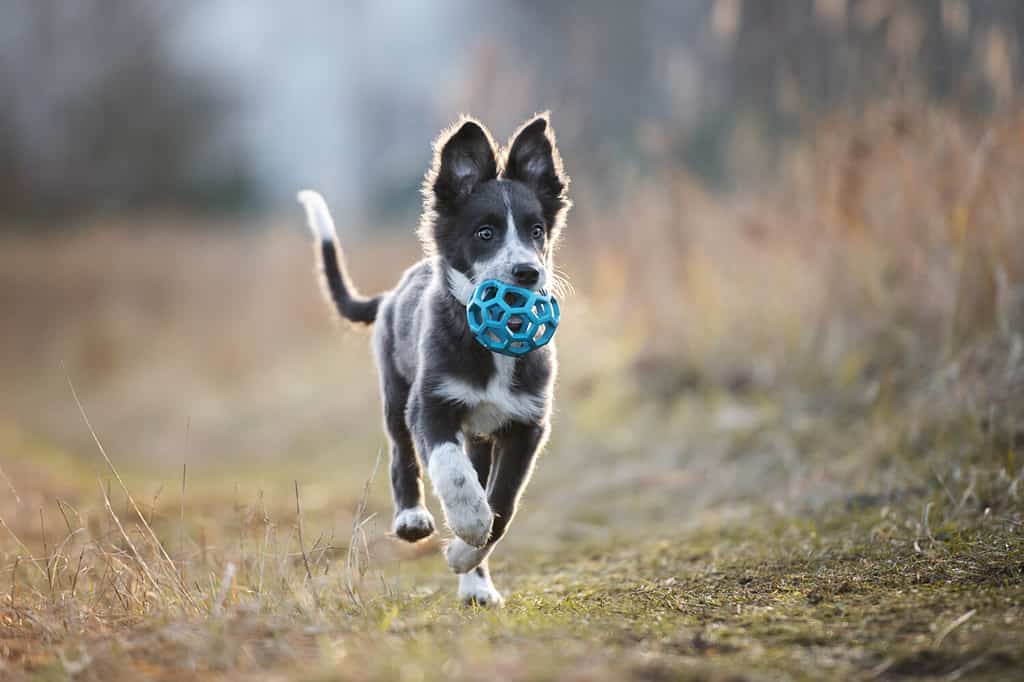
Choose toys, like balls, that your border collie can chase without any risk of choking or swallowing.
©otsphoto/Shutterstock.com
Weather conditions also play a crucial role in canine safety. The pavement during the hot summer months can become extremely hot, potentially burning your dog’s paw pads. To avoid overheating, aim to exercise your border collie during the cooler hours at the beginning or end of the day. Hydration is also vital, so always carry water for your dog, and consider a high-visibility jacket, collar, or harness to increase their visibility during evening walks.
While your dog can feel free during off-leash exercising, make sure this occurs in a controlled, safe environment. Always keep your dog on a leash, which can ensure the dog’s safety and the safety of others, especially in built-up areas and near roads. Additionally, when walking in rural areas where farm animals are present, remember to have your border collie under control to avoid unnecessary stress or harm to the livestock.
Health Concerns for Border Collies

Some symptoms of border collie collapse are disorientation, staggering, and falling to the side.
©absolutimages/Shutterstock.com
All dogs have health concerns, and the border collie is no exception. While border collies are known for their incredible intelligence and agility, they can also be at risk for specific medical conditions that require careful attention and management. Understanding these health issues and taking preventive measures is necessary for maintaining your furry friend’s health.
Border collie collapse (BCC) is a neurological disorder triggered by intense physical activity. This condition occurs in border collies participating in various activities, including working with livestock, agility, flyball, and repetitive ball retrieval. Episodes of BCC, also known as exercise-induced collapse (EIC), exercise-induced hyperthermia, stress seizures, or “the wobbles,” typically manifest 5 to 15 minutes after intense exercise.
While the factors contributing to these episodes, such as excitement, heat, or exercise intensity, are not fully understood, some dogs may only exhibit symptoms following exercise. These episodes normally last about 5 to 30 minutes, and affected dogs generally recover completely. However, they may be unable to continue exercising and may need to retire from competition or work.
Aside from affecting border collies, BCC may also impact other breeds like:
Additional Border Collie Health Concerns
Border collies are also susceptible to various other health concerns, including:
- Ceroid Lipofuscinosis (CL)
- Collie Eye Anomaly
- Epilepsy
- Goniodysgenesis (a predisposition to glaucoma)
- Hip Dysplasia
- Imerslun-Gräsbeck Syndrome/Cobalamin Malabsorption (IGS)
- Multidrug Resistance Mutation (MDR-1)
- Sensory Neuropathy (SN)
- Trapped Neutrophil Syndrome (TNS).
Regular veterinarian visits, screenings, and tests are necessary for managing your border collie’s health and safety.
Border Collie FAQs (Frequently Asked Questions)
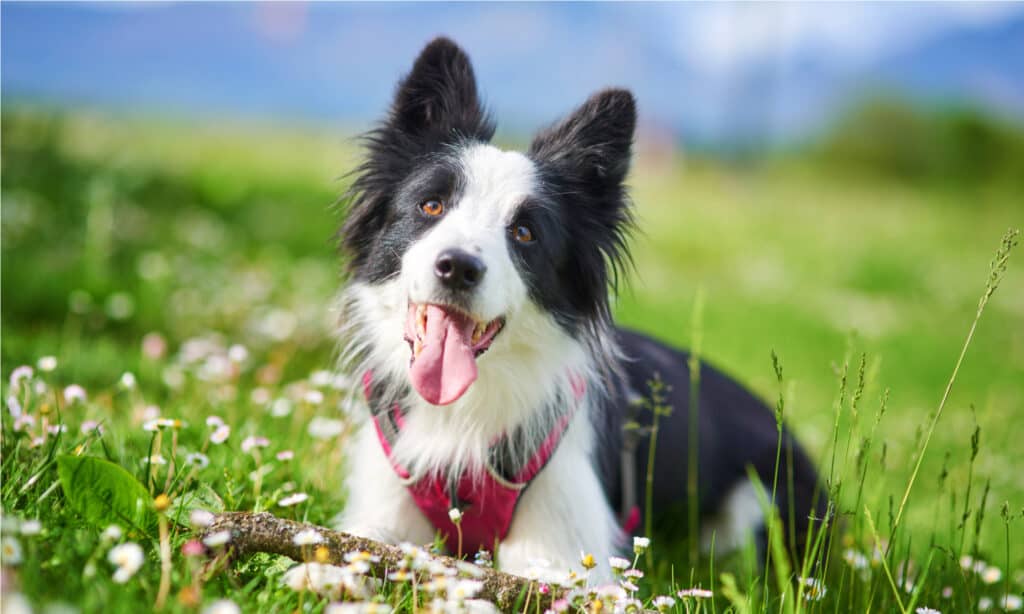
Border collies are prone to anxiety due to their high intelligence and activity level.
©sonsart/Shutterstock.com
How far should border collies be walked?
Border collies require a minimum of two hours of exercise daily. This can be divided into various enjoyable activities to keep both you and your dog engaged!
Are border collies high maintenance?
Border collies are among the more high-maintenance dog breeds. This breed demands a combination of physical activity and mental stimulation to fully meet their requirements.
What are the challenges of owning a border collie?
Border collies have a strong need to stay occupied, which can lead to restlessness.
What happens if a border collie doesn’t exercise?
Border collies that lack sufficient exercise may develop behavioral issues, experience feelings of depression, and exhibit signs of separation anxiety.
The photo featured at the top of this post is © xkunclova/Shutterstock.com
Ready to discover the top 10 cutest dog breeds in the entire world?
How about the fastest dogs, the largest dogs and those that are -- quite frankly -- just the kindest dogs on the planet? Each day, AZ Animals sends out lists just like this to our thousands of email subscribers. And the best part? It's FREE. Join today by entering your email below.
Thank you for reading! Have some feedback for us? Contact the AZ Animals editorial team.






